NOT SO WONDERFUL
Well, news has come in this week that has not exactly put me in the best of moods – and yes I know this is super first world problems. The news comes in the form of two scoring assignments, with composer Harry Gregson-Williams taking on music duties for the 2020 live-action remake of Disney’s 1998 animated classic Mulan, and the omnipresent Hans Zimmer scoring retro-superhero sequel Wonder Woman 1984, which is due next year. Hooray. A couple of things about this have annoyed me, not least that they’re pretty dull choices, but more that they’re both movies that have excellent female role model leads and are appropriate for young people.
I mean, Wonder Woman is a prime example. The first movie was championed as a progressive flick because of it having the first superhero female director and a huge deal was rightly made out of that. But then they went and gave her a male composer in the guise of Rupert Gregson-Williams, continuing with the motif Hans Zimmer had written for her in Batman V Superman (and interestingly enough Gregson-Williams was a part of Zimmer’s composer factory Remote Control Productions) which resulted in a pretty average score. So for the 80s set sequel, who do they go for? Zimmer. The thing is, film composing is such a sausage factory anyway, and DC are doing this after Marvel have gone with a female composer for their first female superhero movie, with Pinar Toprak scoring Captain Marvel. It’s not like there isn’t even a precedent.
And as it’s set in the 80s, there’s bound to be a retro-feel to the whole thing, so why couldn’t they have gone for someone like Hannah Peel, who is a great electronic female composer, or even Mica Levi? Rachel Portman? Jesus, see if Wendy Carlos would come out of retirement. I mean, if they do want someone to go all synth on them, why not pick someone who did it successfully already with Mark Mothersbaugh, who did amazing work on Thor: Ragnarok? It seems the answer is, to play it safe. To give them a slight benefit of the doubt, there’s nothing to say they didn’t approach others first, but I don’t really see them doing it. DC haven’t really conjured up an above-average score for one of their movies yet, even with someone like Danny Elfman taking a crack.
And then you have Disney, who already have a relatively safe bet in their live-action Mulan, but seem to be in some sort of weird parallel dimension as far as the music goes. First we hear they’re apparently ditching the songs from the original movie, which means at no point will people be emerging from screenings singing "Let’s get down to business!", and they’ve hired the older Gregson-Williams to score. I’ll be honest here, there’s very little from the composer that I’ve ever connected with, and what has is where he’s collaborated with someone else (like his work on Chicken Run with John Powell). I’m sure it’ll be full of bombastic music with lots of ethnically-accurate instruments, but really, this is a poignant Chinese myth that, like Wonder Woman, is about a strong female warrior leading the way. I don’t care whether or not people think movie characters shouldn’t be role models, the fact is they are, and if we’re going to show how great women can be, we should show that in a lot of ways that don’t just mean in a couple of roles, however important they are.
SPECIAL LIMITED PREVIEW
So what is The Innocents? Thankfully, it’s not a remake of the superb 1954 supernatural chiller but instead a new Netflix series that starts on Friday. The blurb says "Runaway teen lovers June and Harry find themselves swept up in a dangerous and confusing new world when June begins to display mysterious abilities." Sounds exciting huh? A bit superheroish, maybe a bit Carrie-esque, hopefully without the graphic menstruating (that would be HBO). Anyway, we have an exclusive stream of the end credit music from the show, composed by the awesome Carly Paradis, who has worked with Clint Mansell amongst others. Have a listen below:
NEW RELEASES
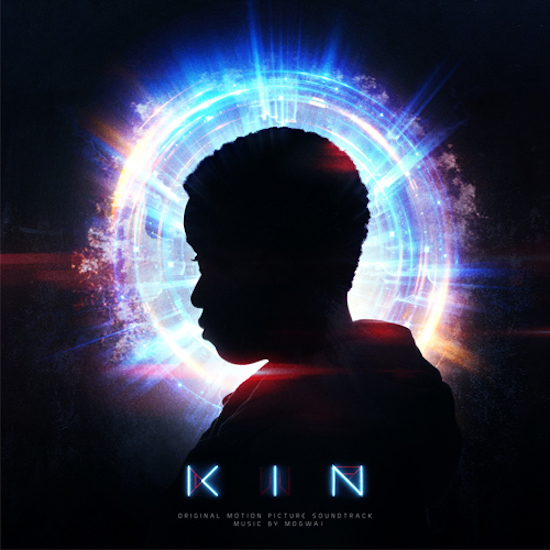
Pulling something special out of their beanies, post-rock geniuses Mogwai have created something uniquely beautiful in their score for science fiction thriller KIN (Rock Action, out August 31). After opening with the haunting piano cue ‘Eli’s Theme’, the traditional haze of guitars comes in to imprint a sense of impact on the listener, like the alarm clock waking you up from a dream that has never before felt so real. And before long it slips back into that meditative landscape, where the ethereal sounds of an astral phase intermingle with familiar waves to evolve into a larger, more encompassing field. It’s fucking beautiful, really. It sounds pretty stupid to talk about music being "cinematic", especially a film soundtrack, but what’s here – particularly in ‘Donuts’ – has the same importance and the same rush that you get in scenes that are just perfectly scored; Scorsese’s ‘Layla’ montage in Goodfellas is an obvious one but still a great example of what I mean, the same with the films of Michael Mann, who himself used some Mogwai tracks on the great 2006 adaptation of Miami Vice. I haven’t seen Kin but the filmmakers undoubtedly have some incredible music to work with, some of the best from this year.
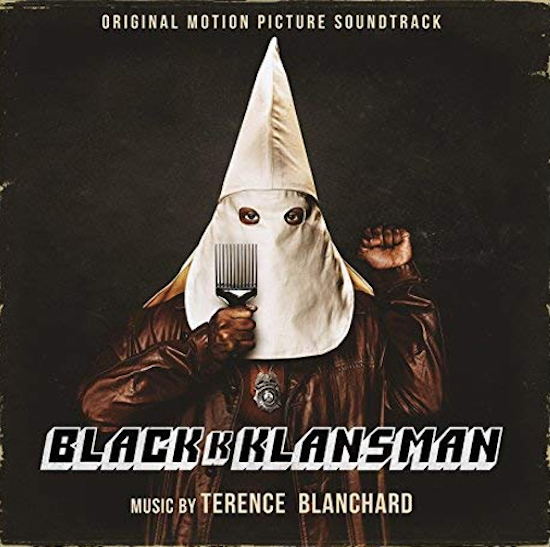
Terence Blanchard’s score for BLACKkKLANSMAN (Back Lot Music, out now), the latest project from Spike Lee, begins with an earnest and noble piece that is designed to embiggen one’s soul with huge militaristic percussion and big orchestra swells that is very classical Americana in itself, and in another film would perhaps be very well regarded as a straight cue. But here, it’s taking the piss – it’s called ‘Gone With The Wind’ for fuck’s sake – and this is Lee and Blanchard taking straight aim at American cinema’s past portrayals of African-Americans and white history. But like the best scores of this type, it really does play it straight much of the time and subsequently Blanchard creates an engaging and introspective work that’s aware of the huge focus placed upon it by not only the narrative by also the audience, his writing not only intelligent and fierce but also beautifully connected thematically.
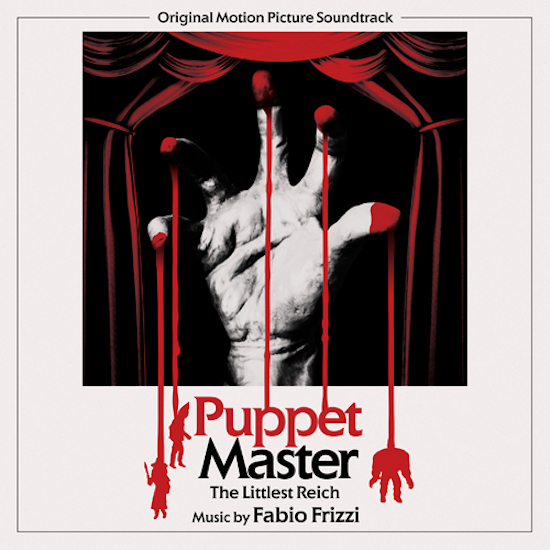
The news of another film in the Puppet Master series was perhaps not surprising given its five hundred prequels but nevertheless, while PUPPET MASTER: THE LITTLEST REICH (Lakeshore, out now) is a neat flick its main attraction is a new score by Fabio Frizzi, the Italian maestro behind the music to the works of horror director Lucio Fulci, such as Zombie Flesh Eaters and City of the Living Dead. What’s fantastic about Frizzi’s score is that his own inimitable style shines through brightly while still paying homage to the music of Richard Band from the original films. Frizzi’s synthesiser is still as sharp as a killer puppet’s blade and his structure and melody work still feels absolutely fresh, especially taking into account modern recording and sonority, but it never sounds like he’s just riding on old glories, be it his or anyone else’s, which tends to happen with a lot of synth these days. Saying that, there is one absolutely killer cue that feels like a crowdpleasing homage to his main theme from The Beyond, and I’ll let it slide because oh my god is it amazing.
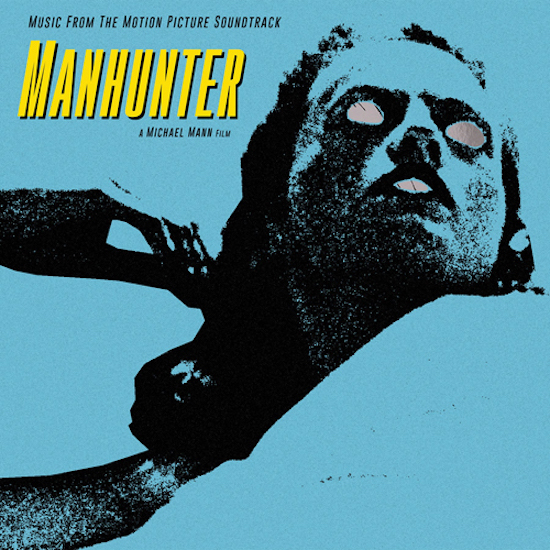
I mentioned Michael Mann earlier, which is a great way to lead into talking about this new pressing of the soundtrack to one of his earlier works, 1986’s MANHUNTER (Waxwork, out now), which was the first on-screen appearance of Thomas Harris’ cannibalistic anti-hero Hannibal Lecter (spelled as "Lecktor" in the film). At this point Mann had made Thief and The Keep, both of which used music by Tangerine Dream as well as other sources, and would continue to apply that tactic here with both songs and score tracks by the likes of session player and composer Michel Rubini and rock bands The Reds, The Prime Movers, Shriekback, and Red 7, with additional music from ex-Tangerine Dreamer Klaus Schulze and Japanese new-age guru Kitarō, along with an appearance from Iron Butterfly’s ‘In-A-Gadda-Da-Vida’, famously used for the final showdown between the two adversaries of the film. Mann’s curation of soundtracks has always been beyond exceptional, and here he uses electronic and rock music to create a connection between FBI agent Graham and killer Dollarhyde that has their minds melding on not just an existential level, but also one of intensity, passion, and anger. This is a great record, and just the cover is amazing. The sleeve has Mrs Leeds from the movie on the cover but her eyes are die cut, with the inner sleeve for A/B being made of mirrorboard to match the scene where Graham sees her like that. Amazing. The score sounds amazing, it’s not amazingly quiet but the mastering really brings out how good this music is, especially the vocal selections and the percussion. It’s also the most complete this score has ever been, which is amazing in itself and how hard it is to get Michael Mann soundtracks that even vaguely match the film.
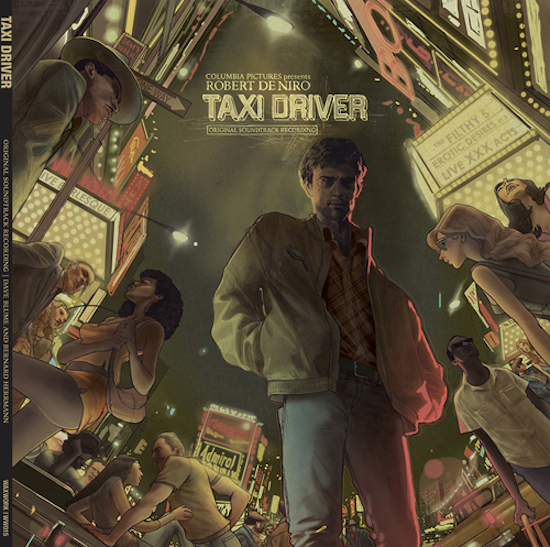
What can I say about TAXI DRIVER (Waxwork, out now)? It’s one of the best scores ever written, a raging fire of a work that spreads from sheer magnetic beauty to the depths of humanity. Bernard Herrmann’s command of the orchestra was never better and it’s so emotionally charged that it’s no surprise Scorsese doesn’t use original music that much – how can one compete with this? You tend to not want to gush too much when you review things, even when it’s maybe the best score ever made, but how can I not? For me, Taxi Driver is Herrmann’s best. Better than Vertigo, better than North By Northwest, better than Psycho. It’s a towering score and it’s hard to argue any case against it, but why would you want to? Waxwork’s presentation is appropriately lavish, with a stunning sleeve painting by artist Rich Kelly, along with a bright yellow taxi colourway on the record itself. They include the complete film score as well as the original Arista LP program, which includes a more chilled interpretation by jazzman Dave Blume along with a vocal track of Travis Bickle’s various narration about his journey across the streets of NYC, and liner notes by Scorsese himself. Waxwork’s pressing is impeccable, with minimal surface noise affording that saxophone and those ratcheting snares a full-bodied reproduction. Beautiful.
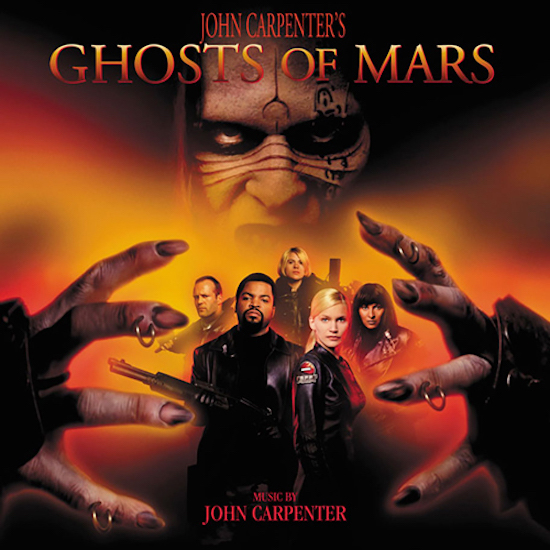
John Carpenter’s score to JOHN CARPENTER’S GHOSTS OF MARS (Varèse Sarabande, out now) – now getting a lovely vinyl reissue* – is a full-on celebrity affair if you’re into rock and metal, boasting the input of Steve Vai, Buckethead, Elliot Easton, and Robin Finck, as well as the entirety of Anthrax sans vocalist (who at that point would have been John Bush after Joey Belladonna was fired). As such Carpenter’s synth grooves, which here are rather more technofied, are surrounded by the licks, noodles, and growls of the aforementioned metal gods and their guitars, and it works bloody well. Carpenter’s metallic textures, as heard in scores like Escape From New York, blend perfectly with the scratching and scraping of guitar strings, and with the neo-cowboy feel that inhabits nearly all of his movies, you’re in for a rollicking good time. That is what cowboys say, right?
*For this occasion a digital copy was provided, thus we cannot comment on the quality of the album’s pressing.


